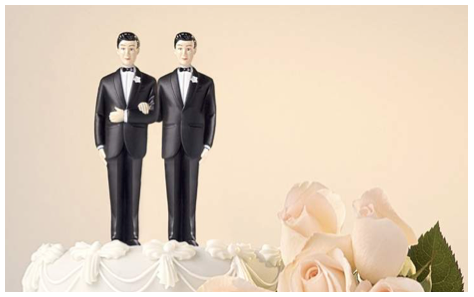Comments
GUEST WORDS— Jack is sure that when the “love thy neighbor as thyself” was announced, that did not mean that Jack had to love his neighbor as himself if the neighbor was gay.
December 5, 2017 is the magic date. That is the date the United States Supreme Court will hear the landmark case of Obergefell v. Hodges, which might also be called the Wedding Cake, the Lord and Jack Phillips.
Jack Phillips is the owner of the Masterpiece Cakeshop in Lakewood, Colorado. One of the things Jack loves to do is bake cakes. He does it in the shop in which his cakes are also sold and, as he will be the first to modestly tell you, God is his chef. He and God work hand in hand producing Jack’s wonderful creations.
(Creating things is, of course, God’s strong suit and, in God, Jack has an able assistant.) God, through one of the Ten Commandments, instructed Jack to love his neighbor as himself, and, presumably, treat his neighbor as he would be treated, and Jesus described that Commandment as one of the two most important commandments ever pronounced, the other having to do with loving God. Those commandments, (along with the other eight) were promulgated, as it were, before the United States Supreme Court ruled that the U.S. Constitution (which is in the same category of really important pronouncements as the Ten Commandments) had said gays had a right to marry. Jack is sure that when the “love thy neighbor as thyself” was announced, that did not mean that Jack had to love his neighbor as himself if the neighbor was gay.
Since God forgot to say anything about loving gay people as you love yourself, Jack considers himself a self-deputized spokesman for God. What Jack said God told him to do, is to save his baking skills for the heterosexual. That is not quite how God put it. The way God put it, using Jack as his spokesman, is that Jack should not make cakes for gay people to use at their weddings because it violates Jack’s Christian beliefs, and Jack’s Christian beliefs are, of course, derived from God. There is no indication that God has any objection to Jack selling cakes to people who are gay nor, apparently, does God object to a gay person eating one of Jack’s cakes. God’s only objection to cakes and gays, is if Jack makes a cake that is specifically baked to be served at a wedding of gay people.
To some it might seem curious that when considering for whom Jack may bake, God has focused on weddings of people who are gay. Acting as God’s spokesperson, Jack has not said God would object if he elects to bake a cake for a wedding of an heterosexual couple, each of whom was previously married and who, while married, committed adultery. God, speaking through Jack, would say that Jack has no objection to baking a cake for that occasion even though one of the Ten Commandments specifically prohibits committing adultery. To bake a cake for those who commit adultery would seem to be as bad as, if not worse, than baking a cake for gays, since adultery is expressly forbidden by God.
There is a reason God has made himself known in Jack’s kitchen. It is because of what could be called a “Godly oversight.” Jack is addressing an issue that God had overlooked because it never occurred to Him that men would want to marry men or women would want to marry women. From God’s perspective, men marrying women and women marrying men made perfectly good sense since that way people would reproduce. As an added bonus, the process of insuring that there would always be people on the earth was fun for the participants in the process. Had God thought of the now common alternative and wanted to ban it, He could have come up with an 11th Commandment. It would have read something like this: “Thou shall not bake wedding cakes when the weddings are for a man to marry a man or a woman to marry a woman.”
One thing is absolutely clear. God is indebted to Jack for letting people know how God would have felt about gay marriage had God thought of it when assisting in the promulgation of the Ten Commandments. And God is no doubt especially pleased that rather than having his feelings about gay marriage explained by some prelate in fancy dress in a magnificent church or cathedral, he has imparted his message through a simple and humble baker in a place called Lakewood, Colorado. Now God will join the baker in awaiting the decision of an entity almost as important as God, an entity whose decisions frequently have more far reaching effect than God’s own pronouncements-the United States Supreme Court.
(Christopher Brauchli is a columnist and lawyer known nationally for his work. He is a graduate of Harvard University and the University of Colorado School of Law where he served on the Board of Editors of the Rocky Mountain Law Review. He can be emailed at [email protected]. This perspective was posted first at Common Dreams.)
-cw
















